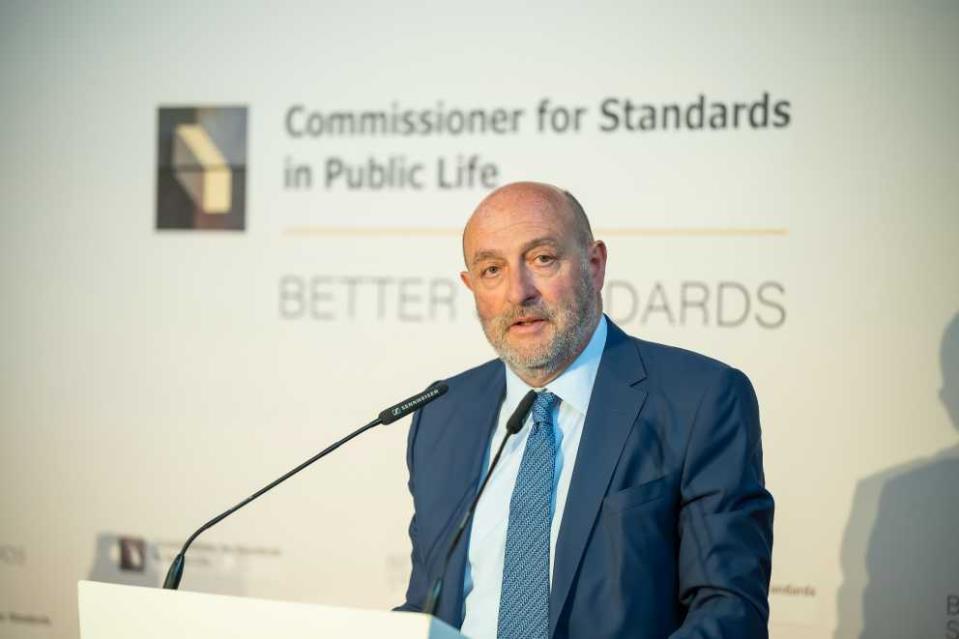Parliament’s committee for standards in public life should be bolstered by non-MPs and should be chaired by a retired judge appointed by all political parties, according to recommendations put forward by the OECD.
The recommendations come as part of a two-year project in conjunction with the Office of the Commissioner for Standards in Public Life and the European Commission.
The recommendations, presented on Monday, focus on three key areas: strengthening the role of the Commissioner for Standards, strengthening the Standards in Public Life Act, and strengthening rules on lobbying.
Strengthening the Commissioner’s role
The OECD recommended that the functions of the Commissioner should be enshrined in the Constitution, and the commissioner should be assigned a legal personality. The conditions of appointment and reappointment should be realigned with those of the Auditor General and the Ombudsman
Commissioners should be appointed for a five-year term with the possibility of reappointment for another term.
The functions of the commissioner should include organising workshops for officials covered under the Act, including workshops for new MPs soon after they are elected.

Other recommendations include setting up a portal allowing for anonymous complaints to be lodged and information campaigns about whistleblower protection mechanisms.
The OECD has also recommended a total revamp of how the Committee for Standards in Public Life is composed. Currently, the committee is composed of four MPs – two from the government and two from the Opposition – and is chaired by the Speaker of the House.
The Speaker, Anglu Farrugia, himself a former Labour MP and deputy leader, has often been accused of siding with the government when the committee deals with reports finding breaches of ethics by Labour parliamentarians.
It is now being recommended that two lay members (non-MPs) are introduced to the committee initially, with the number eventually rising to four. The committee should be chaired by a retired judge who is approved by all parties represented in Parliament.
Strengthening the Standards in Public Life Act
The OECD has also put forward a number of recommendations to improve and close loopholes in the law regulating standards – the Standards in Public Life Act.
These include widening the scope of the Act to cover at-risk elected and appointed positions and amending the Constitution to prohibit elected officials from obtaining secondary employment in all public functions.

There should be a more clear-cut definition of ‘persons of trust’ to ensure that all those falling under such a definition are covered under the Commissioner’s remit.
The government is being urged to revisit the policy on engaging persons of trust to restrict usage beyond appointing political advisors. Another recommendation is for the annual publication to Parliament of a report setting out the numbers, names, and pay bands of persons of trust.
There should be a clear definition of ‘misconduct’ in the Standards Act and ensure former MPs can be investigated and sanctioned for misconduct that took place during their term in office. There should also be clear definitions on ‘abuse of power and privileges’, ‘conflicts of interest’ and ‘gifts’
The timeframes for submitting complaints on potential misconduct of persons covered by the Act should also be revisited.
The Act should be amended to enable the Commissioner to receive and investigate anonymous complaints, and to grant whistleblower status to public employees who disclose misconduct.

The law should also be amended to include further details on the proceedings after an investigation, including on the publication of case reports. Currently, it is up to the Parliamentary committee to decide whether a report is published or not.
Another recommendation is for the establishment of a comprehensive and proportionate system of sanctions.
Rules on lobbying
According to a recent EU survey, 82% of Maltese believe that too close links between business and politics lead to corruption, 77% believe that favouritism and corruption hamper business competition, 71% believe that corruption is part of the business culture, and 70% believe that the only way to succeed in business is to have political connections. In all categories, Malta scored higher than the European average.
According to a recent EU corruption barometer, almost half of the Maltese think that the government is controlled by private interests.
The OECD is recommending that the Maltese government regulates lobbying through a dedicated law – the Regulation of Lobbying Act – and this law should be overseen and enforced by the standards commissioner.
The law should include a gradual system of financial and non-financial sanctions depending on the nature of the breach and applied at the entity level. It should also include provisions that enable the Commissioner to send formal notices and apply administrative fines to incentivise compliance.

There should be a revision of the definitions of lobbying in the law, which would also require regular, timely updates to the information contained in the Register for Lobbyists and the Transparency Register.
The Office of the Principal Permanent Secretary could develop specific principles, rules, standards and procedures for public officials to foster integrity when interacting with lobbyists.
The Office of the Prime Minister could adopt cooling-off periods for elected officials to mitigate the risks posed by ‘revolving door’ policies – a process whereby public officials move to private sectors they previously regulated upon resignation.
The Commissioner for Standards in Public Life could consider developing and adopting a Code of Conduct for Lobbyists.
Obstacles, lack of feedback
Addressing the event, standards commissioner George Hyzler, who is on his way out after he was appointed to the European Court of Auditors, said he has submitted the three reports to the Prime Minister and the Justice Minister.
He spoke on the importance of a culture change, and on achievements his office made over the past few years and the obstacles it encountered.

“At times, my office and staff were subjected to unfounded attacks following the publication of some ground-breaking reports. These unfair attacks were blatantly personal in nature, but they aimed to discredit my office and dent what is generally perceived as a strong performance of the newly established institution.”
He also noted that he submitted a recommendation for the revision of the codes of ethics for MPs and Ministers in July 2020 to the Committee for Standards. “Unfortunately, the Committee has not yet had the opportunity to have a proper discussion on the matter.”
Hyzler also noted how he has received “very limited” feedback from the government and no feedback at all from the Opposition on his consultation paper on lobbying, which was published in February 2020.
Hyzler said he will be leaving an important component of the project, that on asset declarations and conflicts of interest, to his successor.

Also present for the event was Kathryn Stone, Parliamentary Commissioner for Standards of the House of Commons of the UK.
All members of the Standards Committee were invited to the event. Some ten Opposition MPs attended, while no one from the government side was present, something which was pointed out by some of the attendees during a question-and-answer session.
Photos: Rene Rossignaud